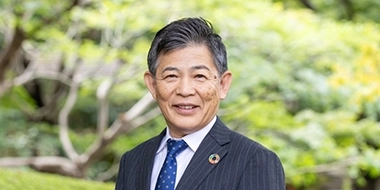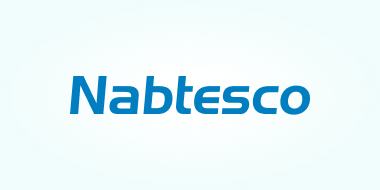
Human Capital Development
Basic Approach and Policy
Human Capital Development Toward Building the Optimal Human Capital Portfolio
As a means to secure, both quantitatively and qualitatively, personnel necessary for us to become “Leaders in Innovation,” as upheld in the long-term vision, we are reforming our education and training systems to enhance our human capital through education and reskilling while also bringing in new talent through recruitment. Moreover, for the achievement of the long-term vision, we decided to focus on DX-, women-, global and Senior Talent-related items as priorities for our human capital portfolio management and are enhancing and improving related training and educational opportunities.
Measures
Fostering a Culture of Autonomous Learning
In 2024, we introduced a new personnel system for managers, which was rolled out to general employees in 2025, thereby becoming an environment that further motivates growth and encourages proactively taking on challenges.
Against this backdrop, we have developed an education framework that enables all employees to engage in autonomous learning, taking into account their roles, aspirations, and aptitudes.
By actively incorporating open-enrollment training programs and on-demand learning services, we are enhancing the range of options to enable employees to select and learn skills that they personally consider to be important. In addition, through career education by length of service and communication initiatives such as one-on-one meetings, we motivate employees to learn for their own career development, thus cultivating a culture of autonomous learning.
In recent years, we have also introduced an online video learning service that enables employees to acquire cutting-edge knowledge and skills tailored to their individual needs, thereby expanding opportunities for autonomous learning.
Education Scheme (excerpt) (As of July 2024)
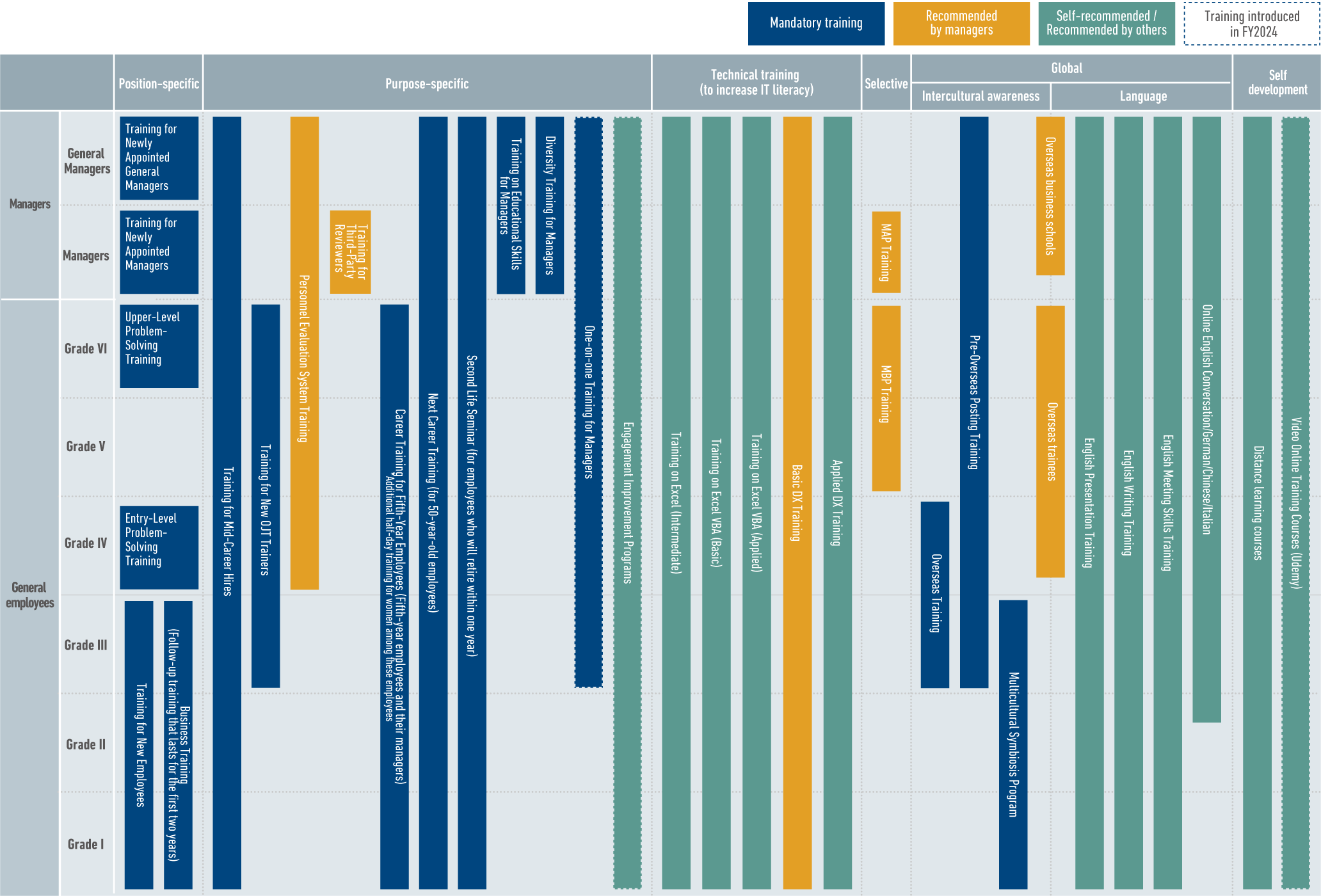
FY2024 Training Programs Provided by the Human Resources Department (from January to December 2024) (Unit: Number of Trainees (persons)/ Attendance Rate of Target Persons (%))
| Training for New Employees | 97/100 | Video Learning Service | 350/100 | |
|---|---|---|---|---|
| Entry-Level Problem-Solving Training | 59/100 | Overseas Position Training | 23/100 | |
| Upper-Level Problem-Solving Training | 37/100 | Overseas Language Study (overseas trainees) | 4/100 | |
| Training for Newly Appointed Managers | 18/100 | English Writing Training | 2/100 | |
| Training for Newly Appointed General Managers | 11/100 | English Presentation Training | 1/100 | |
| Training for Newly Employed Mid-Career | 48/100 | Training on Meeting Skills in an International Setting | 5/100 | |
| Business Training | 45/100 | OJT for Newcomers | 81/100 | |
| Second-Year Report Presentation (head office workers) | 36/100 | Next Career Training (for 50-year-old employees) | 81/100 | |
| Career Training for Fifth-Year Employees (for fifth-year employees and their managers) | 67/100 | Excel-Related Training | 7/100 | |
| Training on Management Basics | 20/100 | DX Training | 217/100 | |
| Dispatch to Business Schools in and outside Japan | 3/100 | Second Life Seminar | 47/100 | |
| Advanced Management Program | 11/100 | Special Training for Women | 13/100 |
Annual total number of participants (for training provided by Human Resources Dept.)
| Total hours of training | The number of hours of training per person | |
|---|---|---|
| Non-consolidated | 67,068 hours | 27.0 hours |
| Consolidated | 134,101 hours | 16.3 hours |
Career Support
In order to help employees develop their careers, we provide fifth-year employees and those who will soon become members of the elderly group with career development training. Moreover, in 2022, we established a contact point both inside and outside the company for career counseling to support both new employees and those in the elderly group in building their careers. We also provide female employees and non-Japanese employees with a range of consulting services according to their life plans and to their specific problems, respectively. The career consultation service is staffed both internally and externally by nationally certified career consultants, and has handled a cumulative total of 45 consultation cases since the service was established.
In 2018, we introduced an internal recruitment system as a voluntary transfer measure. In 2023, we established the “Job Challenge System,” which adds internal and external dual job systems and an internal exchange system to this system, and we are operating human resource fluidity measures. The internal dual job system and the internal exchange system are new systems, and we are working to inject vitality into them. The external dual job system introduced in 2022 is being operated under legal restrictions while limiting the scope of application; however, unique examples have emerged, including jobs that cannot be experienced within the company and those involving the acquisition and study of skills that are connected to daily work.
Overview of the Job Challenge System
| System | Job Challenge System | |||
|---|---|---|---|---|
| Internal recruitment | Internal exchange | Internal dual job | External dual job | |
| Overview | A system whereby employees can apply for internal job openings and, through a selection process, be transferred to a department of their choice. In principle, the positions are the same as those available for career hires. | A system whereby employees can apply for internal job openings and, through a selection process, temporarily leave the department to which they belong and transfer to a department of their choice. After the exchange period completes, the employee is expected to bring back the skills, knowledge, etc. gained from the exchange program to their home department. | A system whereby employees can apply for internal job openings and, through a selection process, work in the department of their choice for a portion of their scheduled work hours. | A system whereby employees may engage in work outside the company outside of their regular working hours. Only side jobs as sole proprietorships or outsourcing contracts that do not involve an employment contract are permitted. |
Through operating and energizing the “Job Challenge System,” we will continue to provide employees with opportunities to take on new challenges, acquire new skills and knowledge, and broaden the scope of their activities, as well as promote the fluidity of human resources that will lead to organizational revitalization and, in turn, drive innovation.
Direction of the Job Challenge System
Internal Recruitment Results (Unit: persons)
| FY2021 | FY2022 | FY2023 | FY2024 | |
|---|---|---|---|---|
| Number of job openings | 40 | 69 | 76 | 7 |
| Number of applicants | 13 | 11 | 20 | 13 |
| Number of successful applicants | 7 | 0 | 4 | 4 |
Development of Experts in DX
In order to foster innovation in each of our businesses, we urgently need to create a new DX-based business model and have our own internal experts in DX to increase the efficiency of our operational process.
At Nabtesco, in addition to raising the level of IT literacy throughout the company through a variety of DX-related training programs, we are working to nurture DX human resources at an early stage by enhancing on-demand learning opportunities and providing on-the-job training through internal exchange programs in DX-related departments.
Among DX human resources, we have launched an initiative to certify those who have the skills and mindset to realize DX promotion in each department within the company as “DX Planners,” and leverage them for evaluation and promotion. We will continue to expand the number of DX planners by providing ongoing DX learning opportunities.
DX Related Training
We use assessments to measure the DX level of each employee and provide systematic training accordingly.
DX-related training includes “DX Basic Training,” which provides participants with the fundamental concepts and basic knowledge of DX, as well as programs tailored to DX application themes in each business, such as “Data Analysis” and “Generative AI.” Through these programs, we support applying DX in actual business operations. As of 2024, 575 employees have received DX-related training, 101 of whom have been certified as DX Planners.
Empowerment of Women
We are working on the further empowerment of women, regarding it as one of the priority issues that we must address to ensure our organizations have access to a diverse workforce of capable personnel. For such empowerment, we deem it essential to build an organizational culture that focuses on fairness beyond simply implementing general measures to ensure gender equality and to provide both men and women with equal growth opportunities.
Based on this belief we are reforming the organization and corporate culture surrounding female employees through specialized training programs and roundtable discussions, as well as other educational and networking opportunities. This is in addition to various systems and measures to support a balance between work and family life, aiming for a ratio of 4.1% of female managers by 2027.
In 2024, we held a networking event to promote the empowerment of women, in which female employees aspiring to management positions exchanged opinions with senior female managers. This event helped to raise participants’ awareness of career development and encouraged internal networking. Going forward, we will continue to provide proactive support tailored to each female employee, fostering their growth so that all employees can design their own career paths.
Development of Globally Competitive Human Capital
To nurture talent capable of leading global business development, which is essential for our growth, we have established an education framework that accommodates a wide range of employee levels. In particular, we emphasize programs for younger and mid-level employees so that they can incorporate “global” into their career paths from an early stage, while fostering motivation to grow and a willingness to take on challenges.
In addition to providing language skill improvement support such as in-house TOEIC programs and online English conversation classes, we offer overseas training programs for young employees, including placements with international NGOs to cultivate cross-cultural adaptability and proactivity. For mid-level employees, we provide overseas trainee programs that enable them to gain practical overseas business experience and develop adaptability in global business settings.
Participation in Collaborative Projects with Overseas NGOs
Through collaboration with overseas NGOs, we aim to develop talent with a global perspective who can achieve missions and make decisions even in different cultural contexts. These programs are also designed to provide employees with opportunities to experience innovation through exposure to new knowledge.
In the training program, our employees join project teams that address real issues faced by NGOs in the Philippines. Working in multinational teams, they employ various approaches to consider solutions, which they either implement or propose.
In addition to helping employees to acquire cross-cultural adaptability, this initiative, through social contribution activities with NGOs, fosters the ability to act autonomously, proactively, and independently within a multinational team as well as cultivates a broader perspective toward the world and society.
Voice from a participating employee
In June 2024, I participated in a four-week overseas training program in the Philippines (Cebu). I interned at an NGO engaged in educational support, where I worked to identify the issues faced by college students as well as organized and implemented workshops aimed at solving those challenges.
One of the most important lessons I learned during the training was the significance of having my own passion when approaching tasks. For the workshop, I wanted to use paper airplanes as a theme because they could make it easier and more enjoyable for the students to explore the root causes of problems and think about solutions, helping them to take steps toward solving their own challenges. Incorporating my own ideas into the program with the other party—in this case, the students—in mind not only kept me motivated but fostered within me a strong desire to contribute, which in turn made the project deeply rewarding.
Since returning to Japan, I now strive to approach my work by incorporating my own ideas rather than being bound by conventional methods, so that both the customers and I myself can be satisfied with the outcomes.
Ryota Tsukamoto,
Procurement Department, Railroad Products Company
Empowerment of Senior Talent
For the optimization of human capital, we aim to empower all our employees to make meaningful contributions. To this end, we focus on providing employees aged 50 and older, who represent a large age group at Nabtesco, with environments where they can exert the full range of their abilities.
In 2021, we provided next career training to employees in that age group to provide them with an opportunity for reskilling so that they can bring their abundant experience to bear in working on new tasks.
In addition, for employees approaching retirement age, we provide a “Second Life Seminar” where they can learn about the public pension system as well as important considerations regarding healthcare, nursing care, and investments. By supporting employees in preparing for life after retirement, we aim to create a workplace where they can continue to focus on their current duties with peace of mind.
Onboarding
Regardless of whether they are new graduates or mid-career hires, we are committing to providing onboarding support for employees newly joining Nabtesco, helping them to quickly adapt to our culture and operations as well as to build fulfilling careers with us.
In addition to providing employee basic education, we enhance engagement by offering post-assignment follow-ups, support for building interpersonal relationships, and initiatives to promote understanding of roles. These efforts contribute to employee retention and success at the company.
Cultivating and Improving the Basic Skills of Young Employees
In onboarding new graduates, we position the first three years after joining as a period for developing and strengthening basic competencies. Training programs are designed by job category, taking into account each employee’s stage of growth.
We also give new employees on-the-job (OJT) training, believing it to be important to offer them hands-on work experience so that they can become effective members of the workforce as soon as possible. Under the OJT system, OJT staff members provide careful instructions to individual trainees, while the trainers themselves also receive training to maintain their instructional skills and to ensure a high-quality training environment.
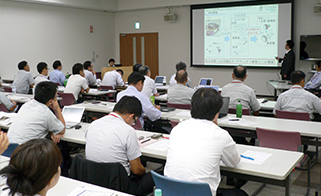
Second-Year Research Report & Presentation
Multicultural Coexistence Program
Starting in FY2023, we introduced a training program for new employees of foreign nationality (employees from countries other than Japan), together with their OJT staff members. This program serves as both an onboarding initiative for young employees and one of our Diversity, Equity & Inclusion (DE&I) initiatives.
By learning about Japan’s unique business culture as well as differences in communication styles across countries, the program helps foreign employees to adapt more quickly to the organization and demonstrate their full potential, thereby contributing to their early success. The program is also valuable for OJT staff members. Learning together enables both sides to come to understand the root causes of miscommunication, leading to fundamental solutions and further contributing to the development of the OJT staff members themselves.
A cumulative total of 22 employees have participated over the past two years, and this number is expected to increase going forward.
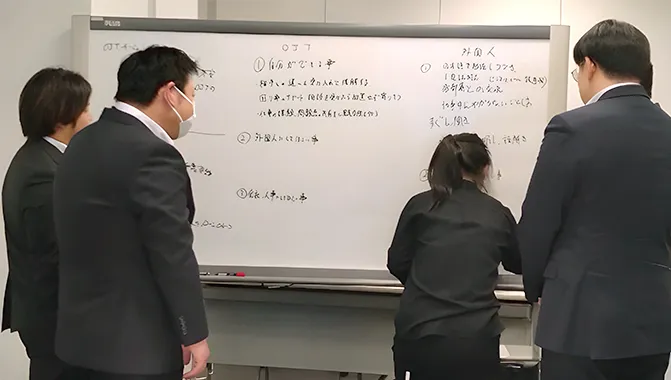
Scene from a discussion between new foreign national employees and OJT staff members
Development of candidates for top executives
The Nabtesco Group is implementing the Management Advanced Program (MAP) to develop candidates for top executives through selective training. Under MAP, trainees will enhance their skills for rational organizational management and deepen the understanding of themselves. Specifically, they will improve their leadership skills from the viewpoint of managers and learn about management strategy and tech novate strategy to create new ideas and business models for the enhancement of their organizational competitiveness.
Also, through this training program, trainees can make exchange and share experiences and ideas with managers of other companies to build new interpersonal ties. Since the program began in 2021, 42 people have attended it in total.
Development of Human Capital at Overseas Group Companies
We are proactively endeavoring toward the development of human resources at Group companies outside Japan. For example, we are actively employing local human resources and implementing various training programs aimed at improving the skills of locally hired personnel. In China, we provide business management trainings for executive candidates at business locations to promote the appointment of locally employed staff for managerial positions and from this talent pool, appoint the presidents of Group companies outside Japan. In addition, we offer an OJT-based training programs designed for skill enhancement, in which employees of overseas Group companies are assigned, for a certain period of time, to factories in Japan belonging to various business segments, including the railroad vehicle equipment, hydraulic equipment, commercial vehicle equipment, and automatic door businesses.
By offering opportunities to deepen their understanding of the Nabtesco Group’s corporate culture and The Nabtesco Way that supports it, and to learn specialist skills, we are developing workers who can contribute to economic development in their home countries. We will continue these efforts to reinforce our overseas operational bases and to contribute to the economic and social development of the countries in which we operate.
Personnel Evaluation System for Human Capital Development and Role Performance
Our personnel evaluation system is an important mechanism that goes beyond merely reflecting performance in various forms of compensation such as bonuses, promotions, and salary increases—it serves to foster talent and encourage employees to fulfill their roles. All managerial and general employees are evaluated under the personnel evaluation system, based on the extent to which they achieve their set goals and their specific actions taken to generate results. The evaluation results are shared through dialogue and review sessions between managers and subordinates, thereby deepening the employees’ self-awareness and recognition of challenges, and ultimately contributing to talent development.
In 2024, we revised our personnel system for managers, introducing an updated framework that incorporates elements of job-based human resource management. Subsequently, in 2025, we transitioned the personnel system for general employees from the conventional function-based system to a role-based system grounded in roles and responsibilities, introducing an evaluation framework that focuses on each employee’s role and expected outcomes. Through these reforms, the personnel systems for both managers and general employees have been unified under a job- and role-based framework, with an integrated evaluation system that is applied consistently across all levels, from managers to general employees.
Personnel evaluations consist of two components: the “MBO Evaluation,” which involves role-based goal setting and assessment grounded in job descriptions and role grade definitions that specify the expected roles of each grade, and the “Behavior Evaluation,” which assesses the specific actions taken to produce results. In the MBO Evaluation, organizational goals are linked with individual goals to encourage each employee to commit to achieving organizational objectives and to heighten overall awareness of collective goal attainment. In the Behavior Evaluation, “expected behaviors” are defined based on the roles and behaviors required of both managers and general employees. For managers, seven items are set, including “Achieving Change” and “Demonstrating Leadership,” which are closely related to the long-term vision, and “Compliance,” which stipulates raising awareness of and communicating compliance within the organization. For general employees, five items are set, reflecting the connection with managerial evaluation items. The degree to which these expected behaviors are practiced is evaluated to clarify the level of alignment and gaps with role expectations, and the framework also serves as a development guide to prepare employees to advance to higher positions.
Also, to ensure that these personnel evaluation frameworks are properly implemented, we hold goal-setting meetings to review target content as well as evaluation review meetings to review assessment results at each layer of the organization. In this way, we carry out various initiatives to entrench and spread the personnel system.
In addition, since April 2024, we have rolled out one-on-one meetings across the company to provide regular opportunities for dialogue between managers and subordinates. These meetings are designed both to address work-related topics and to create opportunities for employees to take the initiative by leading discussions that support their growth and career development. Through this, we facilitate daily follow-ups aimed at achieving goals and promoting growth, while working to enhance trust between managers and subordinates, which serves as the foundation for fair personnel evaluations.
Furthermore, for employees at the department manager level and above, we conduct annual 360-degree evaluations to measure the gaps between their self-recognition and others’ perceptions of their behavior. The results are fed back to the individuals to encourage self-reflection, and, when necessary, the company organizes training programs to strengthen their leadership and development skills. Through these initiatives, we aim to enhance the management capabilities of our leadership team and maximize organizational performance.
Support for Self-Directed Learning
As we foster a culture of autonomous learning, community activities among employees with shared learning themes are also becoming more active. In FY2024, an employee group was established to focus on learning and information exchange related to BI tools and data analysis. More than 100 employees have joined the group, and through company-hosted study sessions, tool demonstrations, and voluntary case study meetings, the group members continue to challenge and inspire one another.
